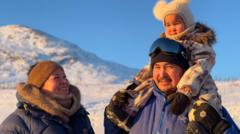The icy expanses of Greenland, with breathtaking vistas and rich traditions, are now echoing with the dissonance of remarks from the incoming US President, Donald Trump. Following inquiries about the sale and potential forceful occupation of Greenland, local sentiments are palpable, reflecting a robust commitment to sovereignty. "Greenland belongs to Greenlanders," asserts a local fishing boat skipper, emphasizing that regardless of presidential interests, their homeland is not for sale.
One of the remote settlements, Kapisillit, showcases the stark lifestyle its residents embrace. Elder Kaaleeraq Ringsted poignantly conveys, "It is not acceptable that he says this. Greenland is not for sale,” indicating a broader desire within the community to uphold their way of life for future generations. Similarly, Angutimmarik Hansen, a farmer and hunter, reflects exasperation at the notion, deeming Trump's threats as the musings of "a stupid person." Yet, Hansen acknowledges a distinction: "But Trump is not the USA. We can work with the people of the USA."
As Trump’s rhetoric swirls, the arrival of Donald Trump Jr. in Nuuk, the capital city, has not quelled concerns. He was greeted by a local businessman and former Trump campaign supporter, who noted the importance of fostering ties. However, the visit underscored a sentiment among many that avenues of cooperation and trade should not be misconstrued as acquiescence to ownership claims.
Prominent voices in Greenland, including local lawmakers and journalists, call for a multi-faceted dialogue about self-determination and independence. Kuno Fencker, an MP, advocates for direct negotiations with the U.S., distancing himself from Denmark's influence in the matter. Yet, the transition to complete independence from Danish subsidies—a vital part of Greenland’s economy—poses significant challenges.
The deep shadows of historical injustices and colonial legacies linger in the collective memory of the Inuit population. Yet, these complexities offer a chance for reconciliation. Experts suggest meaningful discourse about the past, as articulated by Maliina Abelsen, should be pursued to foster healing and unite both Greenland and Denmark in shared responsibility.
In a recent joint press conference, Prime Minister Mute Egede emphasized, "We do not want to be Danish, we do not want to be American, we want to be Greenlandic." This sentiment reflects an increasing push for identity that transcends mere territorial discussions. The air is thick with aspirations for a future that respects both their heritage and their autonomy, even as external forces loom large.
Ultimately, as Greenland stands at this critical juncture, the call for self-determination and the negotiation of its destiny echo throughout its stunning fjords, cementing the notion that its future must remain in the hands of its people.





















